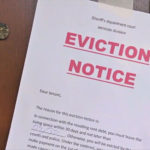A reference of Maine Eviction Laws, and steps of the Maine eviction process for landlords and renters, updated 2021.
- What are the reasons that landlords can evict tenants under Maine eviction laws?
- Non-payment of rent (14 M.R.S.§6002 (1)(C)).
- Non-compliance with the lease agreement (14 M.R.S.§6002).
- Tenant remains in possession of the dwelling unit after the occupancy period without the landlord’s permission (14 M.R.S.§6002).
- What notice do Maine eviction laws require that landlords provide tenants before starting the eviction process?
- Most evictions in Maine require the landlord to provide a 30-day notice to the tenant, including to end a month-to-month tenancy (14 M.R.S.§6002).
- A 7-day notice can be used in the following situations (14 M.R.S.§6002 (1)(A)-(F)):
- Failure to pay rent (14 M.R.S.§6002 (1)(C)). The notice must state the amount of rent that is seven days or more in arrears as of the date of the notice. The notice must also state: “If you pay the amount of rent due as of the date of this notice before this notice expires, then this notice as it applies to rent arrearage is void. After this notice expires, if you pay all rental arrears, all rent due as of the date of payment and any filing fees and service of process fees actually paid by the landlord before the writ of possession issues at the completion of the eviction process, then your tenancy will be reinstated.” (14 M.R.S.§6002 (2)(A)).
- The tenant, his or her family, or his or her invitee has caused substantial damage to the rental property and has not repaired the damage
- The tenant, his or her family, or his or her invitee has caused a nuisance on the property or caused the rental property to become uninhabitable
- The tenant, his or her family, or his or her invitee has violated a law regarding the tenancy
- The tenant has perpetrated domestic violence, sexual assault, or stalking and the victim is also a tenant
- The tenant, the tenant’s invitee, or the tenant’s guest is a perpetrator of violence, threat of violence, or sexual assault against another tenant, tenant’s guest, landlord, or landlord’s employee or agent
- The person occupying the rental property is not an authorized occupant
- Do Maine eviction laws allow landlords to use “self-help eviction” methods, such as locking a tenant out of the rental unit or shutting off the utilities?
- No. Maine law prohibits landlords from denying access to a tenant to the rental unit or their property or interrupting or terminating their utility service. The court can award actual damages or $250, whichever is greater. (14 M.R.S.§6014).
Maine Eviction Process: Step-by-Step
The eviction process in Maine involves these six steps:
- Serve the Eviction Notice. The landlord must provide the tenant with the appropriate eviction notice. The notice must state the specific ground for the eviction. (14 M.R.S.§6002 (2)). The landlord must try to personally serve the tenant with the notice in the tenant’s hand. If the landlord or the landlord’s agent has attempted personal service at least three times in good faith, then the landlord can mail the notice by first class mail to the tenant’s last known address and by leaving the notice at the tenant’s last known place of abode. (14 M.R.S.§6002 (1)).
- File Legal Paperwork. If the tenant does not leave the property by the deadline included in the eviction notice, the landlord can seek judicial relief. The official eviction process in Maine begins with the filing of a Complaint for Forcible Entry and Detainer, which sets out the reason(s) for eviction. The landlord must also obtain a Forcible Entry and Detainer Summons from the clerk’s office. The landlord will need to ask the Clerk of the District Court for the next Forcible Entry and Detainer status conferences and select one. This date will be included on the summons. The legal papers are filed in the district court of the county where the property is located.
- Serve the Tenant. The landlord must try to personally serve the tenant with the legal papers. If the landlord makes three good faith efforts on three different days, the landlord can mail the papers to the tenant and post a notice at their last known place of abode. (14 M.R.S.§6004). These papers must be served on the tenant at least seven days before the hearing date. If the landlord serves the tenant by mailing and posting the papers, the landlord must file an affidavit with the court stating this.
- Gather Evidence. The parties should gather relevant evidence for the case that proves their claims or disproves the claims of the other party. The parties can present this evidence at the hearing. Such evidence may include:
- A copy of the lease
- Payment records
- Photos of the property
- Evidence that the tenant breached the lease
5. Obtain an Eviction Order. If the landlord proves that they are entitled to the eviction, the court will issue a judgment for eviction. The order gives a deadline for the tenant to vacate the property. If that time comes and goes and the tenant remains on the property, the county sheriff can physically remove the tenant.







